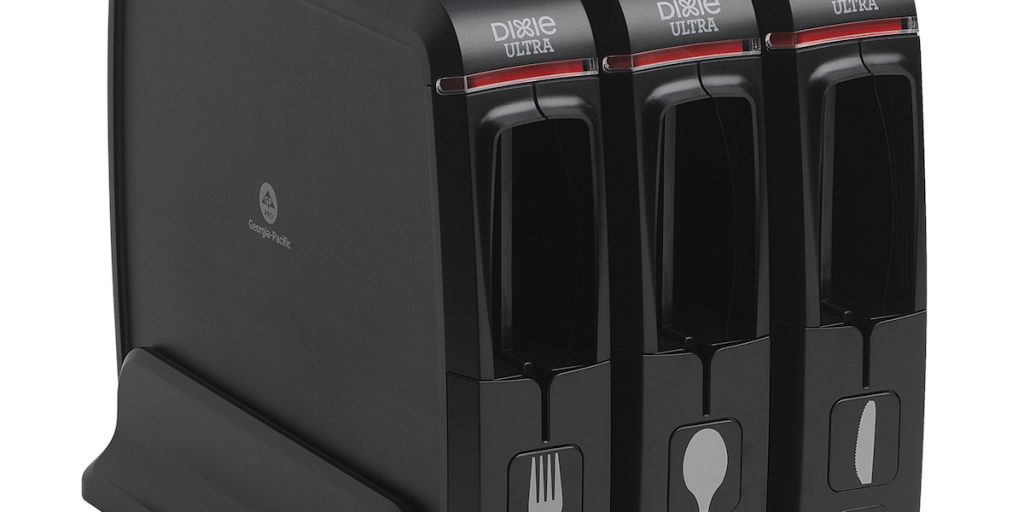Cooperative contracts help agencies acquire touch-free dispensers and technology to reduce germ spread
Worker occupancy in government facilities is slowly improving, even as the Delta variant of the COVID-19 virus disrupts the steady return to work, says Jaclyn Helminiak, customer marketing manager at Georgia-Pacific (GP). The company manufactures tissue, pulp, packaging, building products and related chemicals under brand names including Brawny, Quilted Northern and Dixie.
As government staffers return to the workplace, their expectations have changed and they want to be sure that restrooms, breakrooms and cafeterias are germ- and contamination-free. GP surveys show 51 percent of staffers are concerned about touching soap dispensers and 64 percent worry about touching door handles in restrooms in government buildings. In the break room, almost half of employees are concerned about using reusable cups and silverware provided, and staffers will expect disposable options will be provided in this area.
“There will be a shift to touchless dispensers and automated systems that will help alleviate this cleanliness problem. We expect facility managers will replace air dryers and folded towels with these upgraded systems,” Helminiak says. She took part in a recent OMNIA Partners webinar that showed how OMNIA Partners’ cooperative contracts can help facility managers and government agencies meet their sanitation goals post-COVID. The webinar, “Labor Shortages—Challenges and Solutions for Public Sector Facilities,” also included Scott Wynne, senior director, partner development, OMNIA Partners, and Hannah Young, national account manager, GP.
Helminiak noted that building managers are looking to add automated systems and workflow management systems in their facilities to boost labor productivity and efficiency. The systems, she added, will help reduce equipment downtime as well as improve maintenance teams’ response time. “Touchless systems and automation can provide zero waste, which equals cost-savings. Customizable settings and fewer touchpoints can help reduce change-outs of dispensing equipment and boost efficiencies in the overall maintenance of restrooms.”
In the webinar, Helminiak discussed Georgia-Pacific’s KOLO smart monitoring system for restrooms. The system offers Internet of Things (IoT) interconnections. “Through it, chips and sensors are installed on dispensers, and the system sends notifications to cleaning crews when dispensers are low on product or batteries. The setup reduces the need to check on dispenser supplies and unit performance and operation. Time can be spent on key tasks—what is needed to be done. Along with the IoT setup, we offer many touchless and enclosed dispensing options. The touchless dispensers reduce risk of cross-contamination.” Helminiak said the KOLO system is most used in higher education operations, stadiums and other facilities where there is a lot of foot traffic. She explained that the KOLO system yields substantial labor savings in government facilities and many other operations.
Through his firm’s cooperative contract with Georgia-Pacific, agencies can acquire hygiene products and solutions without conducting their own RFP process, Wayne said. He explained that his firm has six partners who are distributors of GP PRO products, a division of Georgia-Pacific.
“All distributor contracts have been competitively solicited and publicly awarded by a true lead government agency. The process has been done by our lead government agencies and the contracts are ready to use as if they were your own contracts,” Wynne explained. He added that all due-diligence documents covering RFPs and awards for the cooperative deals are available to view on the OMNIA Partners site, 24/7. He noted that through the cooperative agreements, agencies get the best discounts possible from value-added solutions providers on a nationally leveraged pricing model.
Young explained how the cooperative contract simplifies acquiring needed products for government agencies, school districts and higher education operations. “With Georgia-Pacific, you get one rep contact for all your foodservice and restroom indirect spend. You get one installation of products that are supported across our warranty programs and our customer service team. The process is easy and smooth. You can maintain your dispensers through one contact and one key system that work seamlessly to make the job easier for you.”
Foodservice directors are limiting menu items because of labor shortages and supply chain issues, Helminiak stated during the webinar. “K-12 foodservice managers are reducing menu cycles and streamlining inventories because they may have less to spend on. At Georgia-Pacific, we have seen an increase in use of disposables to avoid and eliminate germ touchpoints. We have our GP dispensers that provide touch-free cutlery or wrapped cutlery kits for schools as well.” She noted that consumable items aren’t totally sustainable but alleviating these germ touchpoints and being more focused on cross contamination is key. “We are seeing more interest and an increase in purchases of cutlery kits and dispensers across foodservice operations,” Helminiak added.
Young said that the COVID-19 pandemic has been a learning experience, and that her firm is working to ensure no supply bottlenecks in the future. “We have made significant investments in manufacturing processes to ensure that we have a robust inventory so we will be prepared. We are in a very good position now in our paper line. We manufacture all of our products in North America.” Young noted the critical shortage of truck drivers in the U.S. as well as worldwide. “There are fewer truckers out there to meet demand, so there sometimes is a delay when it comes to shipping. We have adjusted our supply chain to work within those new constraints.”
Michael Keating is senior editor for American City & County. Contact him at [email protected].




















